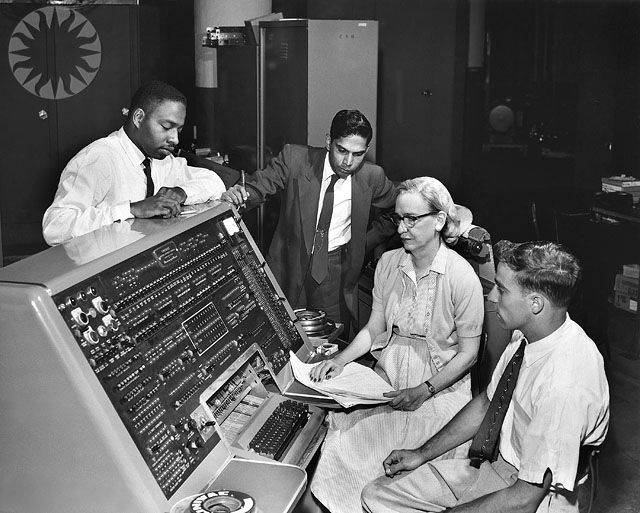This week around the world, tens of millions of students are doing an Hour of Code. For many this will be their very first taste of programming and the beginning of a lifelong journey.
Why is the Hour of Code this week and not some other time? From their website:
Computer Science Education Week is held annually in recognition of the birthday of computing pioneer Admiral Grace Murray Hopper.
Did you know women were the first and most influential programmers? There are excellent historical role models for girl coders.
Ada Lovelace and Grace Hopper
Ada Lovelace is credited as the first computer programmer.
Charles Babbage designed an Analytical Engine in 1837 – a general purpose computer that could be programmed. But the theoretical machine didn’t do anything without instructions.
Ada Lovelace created and published an algorithm for the Babbage Analytical Engine to compute Bernoulli numbers. It was the first algorithm designed specifically to run on a computer, making her the very first computer programmer, even though the Analytical Engine was never built in her lifetime.
Perhaps the most important turning point in computer science is also thanks to a woman, Admiral Grace Hopper.
Computers in the 1940s took up the entire room and were capable of precise computations. But to program it you had to know the inner workings of the machine. This was difficult work involving 1s and 0s that would only work on that exact computer.
Grace Hopper created the first compiler, which made programming more accessible. It allowed for writing code in human language, like “if / then”, which a computer would translate into instructions it could run.
Today there are millions of programmers thanks to the usability trend started by Grace Hopper.
Role Models for Girl Coders
History often is the story of great men, simply because of women’s former role in society. Computer programming is the opposite – women have played a larger role in the early history then men.
Fast forward to today and there is a gender gap in coders, with more men than women. According to Girls Who Code, just 18% of computer science graduates are women.
The research suggests starting young is key to correcting this imbalance.
Breakout Mentors 1-on-1 students are ages 9 to 14 with 40% girls. Our mentors from Stanford and UC Berkeley are also 40% female, so we are able to provide an excellent role model to which the student can relate.
We are proud of our accomplishments helping young coders. To quote Grace Hopper:
The most important thing I’ve accomplished, other than building the compiler, is training young people. They come to me, you know, and say, ‘Do you think we can do this?’ I say, “Try it.” And I back ’em up. They need that.
